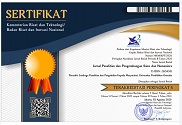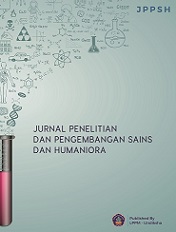Use of ICT in Teaching Islamic Studies in Higher Education Schools
DOI:
https://doi.org/10.23887/jppsh.v7i3.75059Keywords:
ICT, Uses , Higher Education, Islamic StudiesAbstract
Information and Communication Technology is currently recognized as a viable and correct educational tool. The application of ICT makes the teaching and learning process simpler, closer, and easier to do anytime and anywhere. The availability and use of ICT tools in the teaching and learning arena is said to be one of the main determinants of the effectiveness of teaching and learning at all levels of education. Islamic Studies is one of the study programs offered in colleges of education in Nigeria that can be taught using ICT. Therefore, this study aims to examine the influence of ICT on the teaching of Islamic studies in universities of education. Three study objectives and research questions were formulated in this research. Descriptive survey research was adopted in this study. The population of this study were all Islamic Studies lecturers in all colleges of education in Kwara State and purposive sampling technique was used to sample respondents in this study. An adapted questionnaire entitled Uses of ICT in Teaching Islamic Studies was used. The main results of the study show that ICT has a significant positive impact on the effectiveness of teaching and learning. This research reveals that the use of ICT, such as computers, the internet, and educational software, has increased student participation and their understanding of Islamic study material. The implication of this research is that these findings highlight the urgent need to strengthen ICT infrastructure and provide adequate access to digital resources to improve the quality of teaching and learning.
References
Abdur-Rafiu, J., Ajidagba, U. A., & Adam, Z. S. (2020). Gaya Pengasuhan Anak Dan Sekolah Menengah Sikap Siswa Terhadap Studi Islam Di Distrik Senator Pusat Kwara, Nigeria. Jurnal Ilmu Sosial Kiu, 4(3), 7–16.
Agustin, M. (2020). Kegunaan Televisi Dalam Membantu Memecahkan Masalah Belajar Dan Pembelajaran. Gunahumas, 1(2), 182–190. Https://Doi.Org/10.17509/Ghm.V1i2.23039.
Akpan, C. P. (2020). Kompetensi Tik Dan Efektivitas Kerja Dosen Di Universitas-Universitas Di Cross River Negara Bagian, Nigeria. Jurnal Internasional Humaniora Dan Ilmu Sosial, 4(10), 259–266.
Al-Sharaf, A. (2019). Mengembangkan Metode Berpikir Ilmiah Dan Aplikasinya Dalam Islam Pendidikan. Pendidikan, 133(3), 272–282.
Ali Akbar, Abdul Wahid, Syamsul Bahri, Ahlun Ansar, & Askar Nur. (2023). Penerapan Sistem Teknologi Pembelajaran Dalam Pendidikan Nasional. Al-Ubudiyah: Jurnal Pendidikan Dan Studi Islam, 4(1), 119–130. Https://Doi.Org/10.55623/Au.V4i1.201.
Anshori, S. (2017). Pemanfaatan Tik Sebagai Sumber Dan Media Pembelajaran Di Sekolah. Civic-Culture: Jurnal Ilmu Pendidikan Pkn Dan Sosial Budaya, 1(1), 10–20. Http://Publikasi.Stkippgri-Bkl.Ac.Id/Index.Php/Cc/Article/View/61.
Berpikir, K., Peserta, K., Pancasila, P., Ilmu, F., Universitas, S., & Yogyakarta, N. (2021). Edcomtech. 15(15), 254–263. Https://Doi.Org/10.17977/Um039v6i22021p254.
El-Sayed, H., Greenhill, A., & Westrup, C. (2023). Saya Mengunduh Jadwal Sholat Saya’: Menjelajah Mediasi Teknologi Praktik Keagamaan Islam Di Tempat Kerja. Budaya Dan Agama, 16(1), 35–50.
Febrianti, P. D. (2019). Etnografi Dalam Pembelajaran Bahasa Inggris. Jurnal Universitas Muhammadiyah Purwokerto, 3(1), 1–13.
Felicia, O. K. (2021). Evaluasi Aksesibilitas Alat Tik Pada Dosen Pendidikan Bisnis Dan Siswa. Jurnal Pendidikan Dan Pembelajaran (Edulearn, 15(1), 64–69.
Hartati, S., Fernadi, M. F., & Utama, E. P. (2022). Integrasi Teknologi Baru Dalam Meningkatkan Pendidikan Islam Di Indonesia. Al-Liqo: Jurnal Pendidikan Islam, 7(2), 159–178. Https://Doi.Org/10.46963/Alliqo.V7i2.581.
Helaluddin. (2019). Peningkatan Kemampuan Literasi Teknologi Dalam Upaya Mengembangkan Inovasi Pendidikan Di Perguruan Tinggi. Jurnal Pedais, 1(1), 44–55.
Hendriyati Haryani, Wahid, S. M., Fitriani, A., & Ariq, M. Faris. (2023). Analisa Peluang Penerapan Teknologi Blockchain Dan Gamifikasi Pada Pendidikan. Jurnal Mentari: Manajemen, Pendidikan Dan Teknologi Informasi, 1(2), 163–174. Https://Doi.Org/10.34306/Mentari.V1i2.250.
Idris. (2015). Efektifitas Penggunaan Teknologi Informasi Dan Komunikasi…. Jurnal Kependidikan Islam, 1(2), 175–190.
Insani, H., Supraptono, E., & Hakim, L. (2016). Penerapan Model Ctl Berbantuan Media Visual Novel Dalam Mengidentifikasi Kegunaan Program Aplikasi. Jurnal Penelitian Pendidikan Indonesia, 1(2), 12.
Ismaniati, C. (2013). Penggunaan Teknologi Informasi Dan Komunikasi Dalam Peningkatan Kualitas Pembelajaran. 15. Http://Staff.Uny.Ac.Id/Sites/Default/Files/Penelitian/Dr. Christina Ismaniati, M.Pd./Penggunaan Teknologi Informasi Dan Komunikasi Dalam Peningkatan Kualitas Pembelajaran.Pdf.
Lestari, I., & Pratama, M. (2020). Pemanfaatan Tik Sebagai Media Pembelajaran Dan Sumber Belajar Oleh Guru Tik. Edumatic: Jurnal Pendidikan Informatika, 4(2), 95–102. Https://Doi.Org/10.29408/Edumatic.V4i2.2634.
Prayitno, E., Kurniawati, D., & Arvianto, I. R. (2018). Pemanfaatan Teknologi Informasi Dan Komunikasi (Tik) Untuk Meningkatkan Kualitas Pembelajaran. Seminar Nasional Konsorsium Untag Se Indonesia, 2(2), 401–414.
Puji Alfiansyah, R. (2023). Manfaat Dari Dunia Teknologi Informasi Dan Komunikasi Dalam Pendidikan. Jurnal Sosial Teknologi, 3(6), 469–473. Https://Doi.Org/10.59188/Jurnalsostech.V3i6.741.
Rohmah, A. (2011). Jurnal Stq_Isi. Rohmah, 3(2), 255–269. Http://Tentangku.Blogsome.Com/Category/Iptek/E-Learning/.
Rusydi, I. (2019). Peranan Perkembangan Teknologi. Journal Of Chemical Information And Modeling, 53(9), 1689–1699. Https://Www.Neliti.Com/Id/Publications/290643/Peranan-Perkembangan-Teknologi-Informasi-Dan-Komunikasi-Dalam-Kegiatan-Pembelaja.
Sari, R. K. (2017). Persepsi Pengajar Dan Pemelajar Terhadap Penggunaan Teknologi Dalam Pengajaran Bahasa Inggris. Sap (Susunan Artikel Pendidikan), 1(3), 333–343. Https://Doi.Org/10.30998/Sap.V1i3.1548.
Septiasari, E. A., & Sumaryanti, S. (2022). Pengembangan Tes Kebugaran Jasmani Untuk Anak Tunanetra Menggunakan Modifikasi Harvard Step Test Tingkat Sekolah Dasar. Jurnal Pedagogi Olahraga Dan Kesehatan, 3(1), 55–64. Https://Doi.Org/10.21831/Jpok.V3i1.18003.
Singh, P. K. P., & Hashim, H. (2020). Using Jazz Chants To Increase Vocabulary Power Among Esl Young Learners. Creative Education, 11(03), 262–274. Https://Doi.Org/10.4236/Ce.2020.113020.
Siregar, Z., & Marpaung, T. B. (2020). Pemanfaatan Teknologi Informasi Dan Komunikasi (Tik) Dalam Pembelajaran Di Sekolah. Best Journal (Biology Education, Sains And Technology), 3(1), 61–69. Https://Doi.Org/10.30743/Best.V3i1.2437.
Sulaeman, A., Darodjat, D., & Makhrus, M. (2020). Information And Communication Technology Dalam Pembelajaran Pendidikan Agama Islam. Islamadina : Jurnal Pemikiran Islam, 14(14), 81. Https://Doi.Org/10.30595/Islamadina.V0i0.7258.
Sumakul, H. I., Tendean, S. V., & Lonto, A. L. (2024). Pemanfaatan Teknologi Informasi Dan Komunikasi Sebagai Media Pembelajaran. Tumoutou Social Science Journal, 1(1), 21–30. Https://Doi.Org/10.61476/Xy1xwh12.
Usman, A. I., Ayuba, O. J., & Adesina, A. (2021). Kecukupan Dan Pemanfaatan Informasi Dan Fasilitas Teknologi Komunikasi (Tik) Pengajaran Studi Islam Di Perguruan Tinggi Pendidikan Di North Central, Nigeria. Jurnal Kajian Pendidikan Billiri, 1(1), 1–6.
Usman, O. Z., & Odion, P. O. (2020). Dampak Teknologi Informasi Dan Komunikasi (Ict) Terhadap Prestasi Akademik Mahasiswa Perguruan Tinggi. Sau Sains-Tek Jurnal, 4(1), 135–146.
Victor, A. A., & Bolanle, R. R. (2017). Luasnya Teknologi Informasi Dan Komunikasi (Ict) Pemanfaatan Pembelajaran Siswa Di Perguruan Tinggi Negeri Ondo, Nigeria. Pengiriman Online, 3(3), 2369–2376.
Wibawanto, H. (2021). Teknologi Informasi Dan Komunikasi Dalam Pembelajaran Sains. 14(2), 1–13.
Widianto, E. (2021). Pemanfaatan Media Pembelajaran Berbasis Teknologi Informasi. Journal Of Education And Teaching, 2(2), 213. Https://Doi.Org/10.24014/Jete.V2i2.11707.
Yahya, A. (2022). Pemanfaatan Teknologi Informasi Dalam Pendidikan Agama Islam. Jurnal Teknologi Dan Bisnis, 4(2), 155–162. Https://Doi.Org/10.37087/Jtb.V4i2.105.
Youssef, A. B., & Dahmani, M. (2019). Dampak Tik Terhadap Kinerja Siswa Lebih Tinggi Pendidikan: Efek Langsung, Efek Tidak Langsung Dan Perubahan Organisasi. Pdt. U. Soc. Pengetahuan, 5(5), 45.
Zedan, A. M., Yusoff, M. Y. Z. B. M., & Mohamed, M. R. B. (2019). Sebuah Pengajaran Yang Inovatif Metode Dalam Studi Islam: Penggunaan Powerpoint Di Universitas Malaya Sebagai Kasus Belajar. Procedia-Ilmu Sosial Dan Perilaku, 182(4), 543–549.
Downloads
Published
Issue
Section
License
Copyright (c) 2024 Usman Adisa Issa, Hammed Olalekan Bolaji

This work is licensed under a Creative Commons Attribution-ShareAlike 4.0 International License.
Authors who publish with the Jurnal Penelitian dan Pengembangan Sains dan Humaniora agree to the following terms:
- Authors retain copyright and grant the journal the right of first publication with the work simultaneously licensed under a Creative Commons Attribution License (CC BY-SA 4.0) that allows others to share the work with an acknowledgment of the work's authorship and initial publication in this journal.
- Authors are able to enter into separate, additional contractual arrangements for the non-exclusive distribution of the journal's published version of the work (e.g., post it to an institutional repository or publish it in a book), with an acknowledgment of its initial publication in this journal.
- Authors are permitted and encouraged to post their work online (e.g., in institutional repositories or on their website) prior to and during the submission process, as it can lead to productive exchanges, as well as earlier and greater citation of published work. (See The Effect of Open Access)









